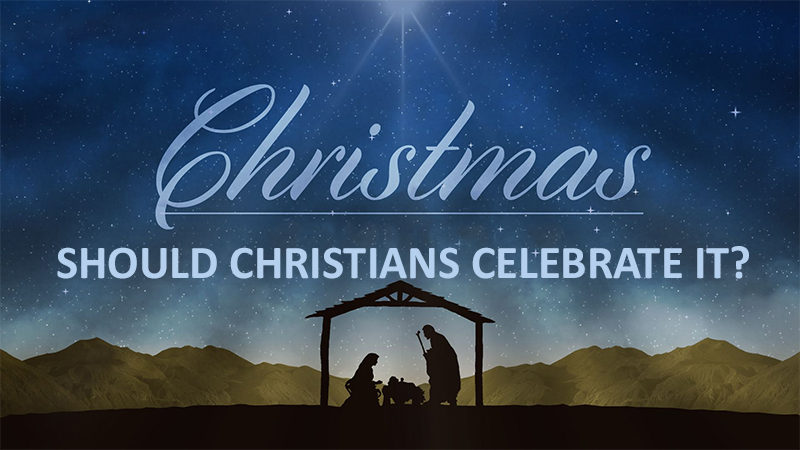No worthy scholar or historian in the world believes that Jesus was born on December 25th. It is common historical knowledge that December 25th “was the ancient feast-day of the Sun, in the depths of winter”, and that it was also the date celebrated by the Romans of Mithras, the Babylonian and Roman sun god. The sun god worship holiday was termed “Dies Natali Invictus”, meaning “The day of birth of the unconquered”, also known as “Sol Invictus”. “Unconquered” refers to several pagan gods including Jupiter, Mars, Hercules, Apollo, and Silvanus.
Additionally, December 25th was the day of the winter solstice, the shortest day of the year, also associated with festivals. Moreover, the Romans celebrated “the last day of the Saturnalia, which had long since degenerated into a week of unbridled carnival…”. Saturnalia, as can be extrapolated, was an ancient festival celebrating the Roman god Saturn. These festivals resulted in sexual degeneracy, debauchery, rape, homosexuality, singing naked in the streets, human sacrifice, and more.
Additional features of Saturnalia, which was celebrated likely as early as the 4th century BCE (before the birth of Christ), included gift giving, which is where modern Christmas gets its gift giving; and eating human shaped biscuits (precursor to modern gingerbread men), which was a symbol of human sacrifice and cannibalism, which was also practiced on this day.
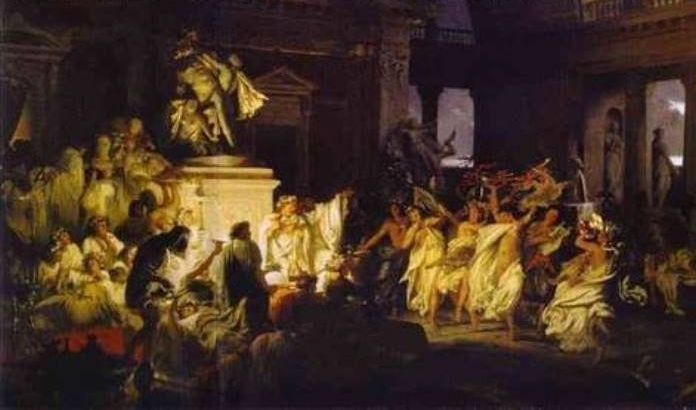
While later the Catholic Church would claim that Saint Nicholas was the origin of gift giving, in order to try to remove or hide some of the pagan origins; in reality it is well-documented that gift giving was celebrated by the pagan festival of Saturnalia, the real origin of our December 25th “Christmas”.
Pagan Christmas symbols
Christmas trees, wreaths, garlands and mistletoe are also of pagan origin.
Christmas trees had several origins. Evergreens has been used since ancient times as a symbol of fertility and the coming harvest. As far back as several centuries before Christ, pagans would bring in trees or wood into the house for worship. The Romans, although they did not bring full trees into the house (they only brought bits of the trees), decorated trees outside with bits of metal and other decorations in celebration of Saturnalia.

During Saturnalia, the pagan Romans would decorate their houses with bits of evergreen shrubs, just like is done with garlands. Wreaths were a symbol of fertility and often adorned with berries to symbolize the coming harvest and candles to symbolize the power of the sun (or worship of the sun). Thus the Christmas lights on a wreath. Wreaths were also used by pagans as a good luck charm to allow the so-called Christmas spirit to enter the house.

Mistletoe was derived from Norse mythology, Druid rituals, and Saturnalia sexual depravity. The god Balder was killed by the god Hoder while fighting for the female Nanna in Norse Mythology. Druid rituals used mistletoe to poison their human sacrifice victims. The Christmas tradition of kissing under the mistletoe was derived from the sexual depravity of Saturnalia sun god worship by the pagan Romans combined with the Druid traditions which had derived from other mythology.
Where do we draw the line?

As you can see, all of the common traditions of Christmas are all of pagan origin. Therefore, we have to determine where the line is drawn.
Should we completely separate from society and not be a part at all of society? A common argument against this is that a person is just doing traditions and they are not doing it for the purpose of worshiping anything pagan. So does that really make it ok to bring pagan symbols into the house? No, but then you have to determine what exactly is really a pagan symbol. We will talk about that in a bit.
Christmas trees, Christmas lights, wreaths, garlands, and other decorations definitely make me feel warm and happy inside. It would be very sad for me to not see any of that. To me, they are simply traditions that I grew up with from my childhood. But, someone from, say, India, might feel the same way about a Buddah statue which is an idol and unquestionably evil. So, the “it was a tradition and makes me feel good” isn’t really a solid argument, since we know there are times this is still wrong. Feeling good isn’t an excuse if the thing is sin.
You really have to draw a line to see how far you are willing to go. If these things will really make God mad, then definitely you have to get rid of them. For sure, outright idols like a statue of Buddah definitely need to be thrown out of the house and burned. But what about a Christmas tree or a garland?
What about if you are simply hanging out in a forest which happens to be evergreens on Christmas? Is this forbidden? I don’t think so.
So what’s the difference between having a plant in the house or having it outside? Is it ok to have a pot of flowers inside for the purpose of brightening the room? Why not? I think that’s fine. So what about having some evergreen decorations that simply liven up the room?

So can Christians have Christmas things?
Since the pagan origins of Christmas have long passed and Christians no longer have any association with paganism and certain Christmas decorations, my personal view is that some decorations may or may not be harmless.
Others, however, perhaps should be avoided. Is your tree the centerpiece of your house and does it distract from worship of God? Do you spend too much time decorating the tree instead of praying and having a Bible study with your family all while playing “O Christmas Tree” pagan tree-worship songs? In this case, I believe you should not have the tree.
In other cases, perhaps the tree simply provides a bit of normality as a backdrop while you teach your children about Jesus and watch clean wholesome Christian Christmas movies like about the birth of Christ. And perhaps you can use it as a ministry tool, simply as a decorative piece to bring over family members to share the gospel with them. I’m not going to say it’s ok then, you need to decide that for yourself. But chances are you aren’t using this as a missions opportunity.
As far as Christmas tree decorations, you better look close as to what’s on that. What shape is it? Is it a pagan idol accidentally (like a false god of some sort)? Does it have ungodly writings on it? In that case don’t put it on the tree!
What about gingerbread men? I doubt you are thinking about cannibalism and human sacrifice. Nonetheless it does incur some feelings like “I’m eating off its head! Arrrgh nom-nom-nom, now its arms!” Sounds funny but I’m not sure if this is ok. Why not just make some circles or other shapes? Better safe than sorry.

How about garlands and wreaths? I can’t say for sure, but if the wreaths and garlands are nothing more than purely decorative, it may or may not be harmless. However, you should pray and see if God is ok with you having it. On the other hand, maybe you live in a neighborhood where others are pagan and they think of it as an idol to worship. Maybe then you shouldn’t have it, especially if it harms your testimony of Christ.
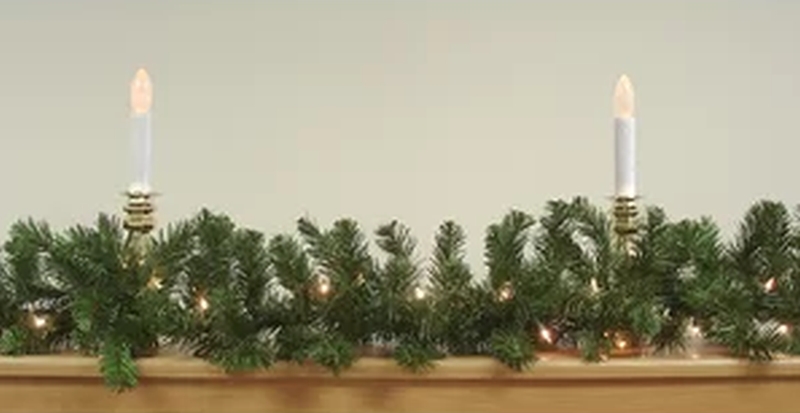
But what about mistletoe? Due to the clear pagan origins which have not been forgotten but still perpetuated, I would say mistletoe should clearly be forbidden in a Christian home. Anything that promotes sexuality, especially among strangers getting “caught under the mistletoe”, is a depraved tradition that should be avoided by any God-fearing Christian.
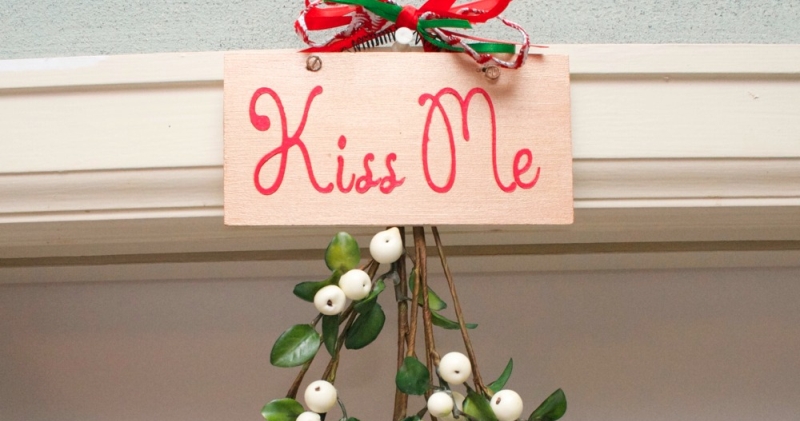
Now, you may be starting to see a distinction. Mistletoe promotes ungodly behavior. Other Christmas decorations may simply provide an environment of warmth and happiness for the cool winter holidays.
How about gift giving?
I gave three gifts: one was a cookbook. And two were devotionals. (They loved the gifts so I guess I did well!) In the Christmas card I wrote messages and poems that included Christian themes and used a Christian-themed cards. Why not? Why not give someone you love and care about something to convey that you care for them?
In my opinion, I think this is perfectly fine. The holiday simply provides a particular time of the year to give a gift. Who doesn’t like receiving gifts? Better yet, who doesn’t like the wonderful feeling you get from giving a gift? And if it also furthers God’s mission, isn’t that a great thing to do? I think so.

Now, if the gift is ungodly, that’s a problem. But that is a different issue.
Some things, like giving gifts, even though pagans also did it, I’m not so sure that you can attribute that to pagans, but simply to human nature. Jesus said “it’s better to give than to receive.” And he said to care for the poor. Why not take the opportunity of the holidays to buy some homeless or hungry people some food or care for them and provide for their needs (if you can afford it)? It’s definitely holy to, in the service of God (and not Christmas! But on the Christmas holiday), give to the poor. In fact you should not only do that on Christmas but also year-round.

Can Christians have Christmas decorations?
Now, does the Bible say anything against decorating your house for the holidays? If the decorations are harmless and definitely do not include anything pagan (like an easter bunny which is pagan, or mistletoe which promotes sexual depravity), then maybe it is ok. But now that you know where these traditions derived, do consider the words of Jeremiah,
(Jeremiah 10:2-4)
It seems to be talking about a Christmas tree. However, further research shows he is probably talking about idolatry. That they were worshiping this idol as if it were a living god.
And songs like “O Christmas Tree” which are literally tree worship, definitely should be forbidden in any Christian household.
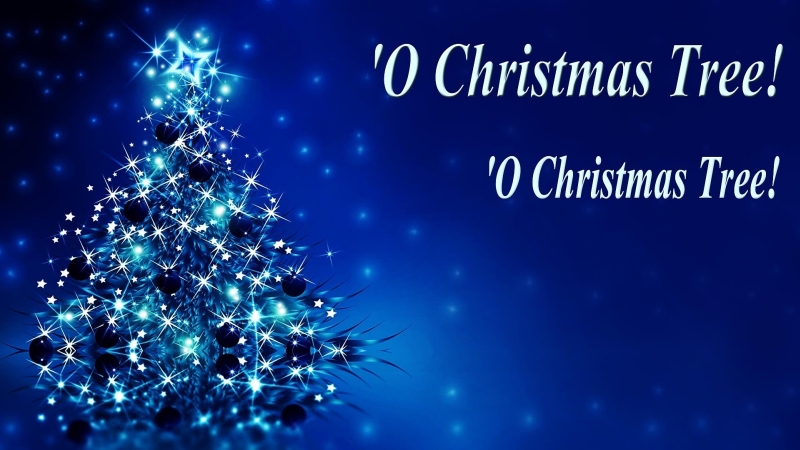
I think very few Christians are actually worshiping their Christmas tree intentionally. I think it’s very possible that some Christians are worshiping the tree without realizing it. Some families may put such a high value on the tree that they abuse their children for messing it up – that would be sinful. Or they yell at their family members because they didn’t “do it right”. Why? Because their value on this physical item is borderline idolatry. They hold it in too high regard.
But, I think that if it’s nothing but a decoration, maybe it is ok. I don’t think God wants us to sit coldly on a cement floor in a tiny square room with grey unpainted walls and nothing on them staring blankly at the wall. I think God wants us to enjoy the world we are in – although not too much. Not more than Him. Regarding trees, God created trees, and if you are not worshiping the tree or putting too high an emphasis on it, then maybe it is ok. But you know in your heart whether God is telling you to do it or not to.
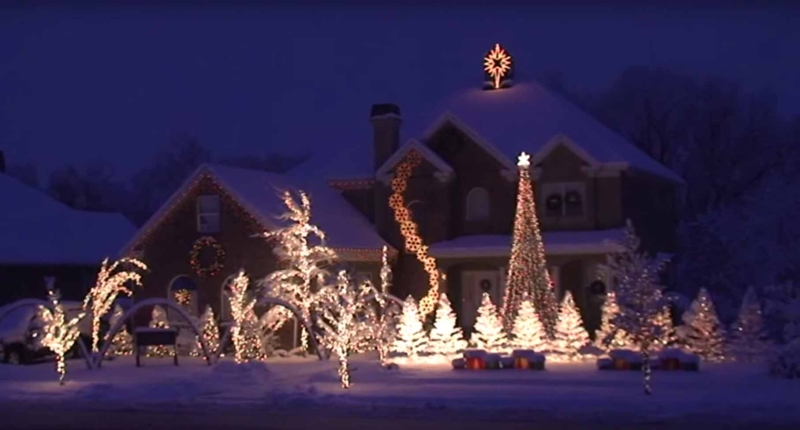
Now, what about Christmas lights? Well I use Christmas lights year round in place of actual lights in the bedroom and in the living room. I like them and the type of light they put out. And so far God has given me blessings and these mini light strings haven’t had any negative impact – that I’m aware of anyway. And thing is that these light strings to me are the same as a light bulb except there is several of them. Maybe in old times pagans used some candles for a pagan tradition, but that is not how I am using my strings of mini lights. So I’m guessing it is probably ok to use Christmas lights as long as you use them rightly – just for lighting, or maybe for decoration. Definitely, for lighting alone is fine. I don’t know about for decoration.
Lights are lights. Plants are plants. Plastic is plastic and metal is metal. But if you put these things in a higher regard or attribute any ungodly significance to them, then definitely there is a problem. If these decorations create dissension or discord in your house, then get rid of them. If they draw your attention away from God, then get rid of them.

However, I think there is a big difference between a piece of a plant “for decoration” and an idol statue of like Buddah or something “just for decoration” even though you are not bowing down before it.
An actual idol like a Buddah statue is a graven image. This breaks the second commandment, if not the first. Bowing down and worshiping, or keeping it for good luck, or putting any conscious thought toward it – that is breaking the first commandment. But even simply having the object is actually breaking the second commandment – no graven images.
Where do you draw the line of “graven image”? If a wreath is a graven image, is a door? How about a house? A chair? A table? A lamp? Something that has a general shape and not something specific, something which is the object it is, and not an idol or statue or symbol of a false god, I don’t think this is a “graven image”.
But be careful. You don’t want to accidentally have any graven images in your house. Maybe even your wreath has some graven images on it. That would certainly be a serious problem. Take a very close look before buying or decorating with anything.
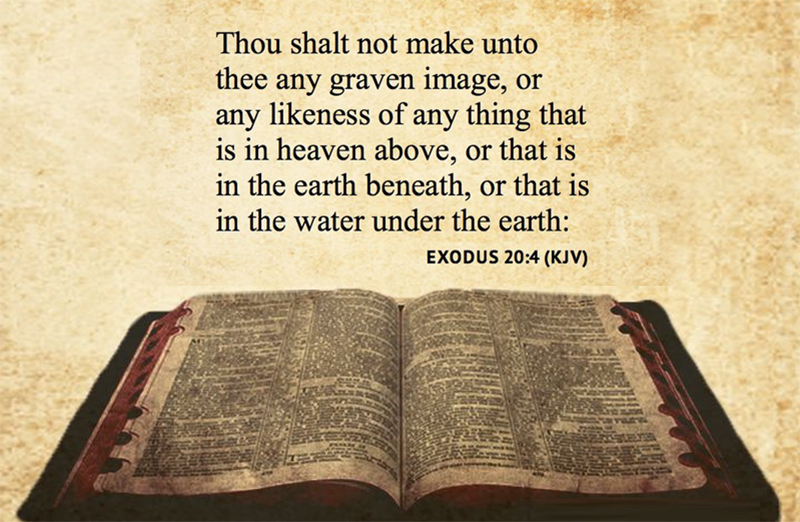
Now, a tree might be up for debate, maybe even a wreath. Christmas lights are not graven images, they are simply a string of lights. And while they may resemble candles, if you are just using them for lighting I doubt God has a problem with this. If you use it for decoration, I don’t know, but I would guess probably not a problem if they are just decorations.
I mean, if you can’t have decorations, where do you draw the line? You can’t paint your house? You have to live in a log cabin? You have to have a fire pit instead of a fireplace because a fireplace looks good? No, I think that is legalism in my opinion. I don’t think God has a problem with simple decorations, unless those decorations physically symbolize something ungodly or an idol – like perhaps a pentagram or a statue of Buddah; or if those decorations cause sin one way or another. I’m not sure it’s good to put a star at the top of the tree either, since you may be putting too high significance on a worldly object. But that one is up for debate.

Should Christians celebrate Christmas?
While much of this is debatable, I believe that for me anyway, God is telling me that what matters more than the decorations themselves are where your heart is. However, a Christian household should never have anything that is specifically an idol like a statue of a false god, and should not play music that is ungodly like “O Christmas Tree” which worships trees instead of God, or have mistletoe which encourages ungodly behavior even accidentally.
But harmless decorations, it’s hard to draw that line if they are truly nothing more than decorations, unless those decorations clearly resemble something ungodly, or they cause someone to sin. For example it would really be a problem to spend thousands or even hundreds of dollars on decorations while neglecting to give any money to the poor and starving when you clearly have more money than you need.
Or it is a problem to put too much energy on decorating that it becomes a time when mom is strung out and mean and hateful and dad wants to retreat to get away from the stress and havoc and the kids are afraid to move lest they do something wrong to incur the wrath of mom or dad. That’s a problem. But if it causes joy through mere environment in the same way as going into a forest for a nice walk while praying to God and worshiping God, I think that is ok.
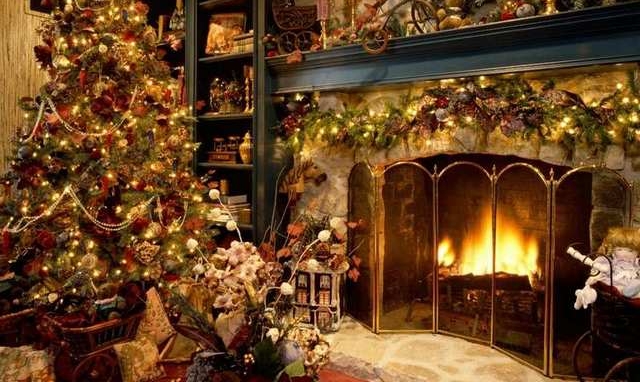
The problem with avoiding holidays entirely could be you are the oddball. But if that’s what God wants, then it’s ok to be the oddball. After all, Halloween should definitely be avoided by Christians. But Christmas? I don’t know. At least, I’m not prepared myself to get rid of Christmas just yet. Maybe this will change, but for now I don’t feel convicted to eliminate and avoid Christmas entirely; just to avoid some things like mistletoe and ungodly things and ungodly songs.
But you should pray and decide for yourself whether Christmas decorations are good for you and your family. Ask God to impress on your heart what He wants you to do, and surely God will show you.
All that said, have a merry Christmas and a happy holiday full of joy and the love of Christ! And be sure to use this time as an opportunity to show the love of Christ to others one way or another!



